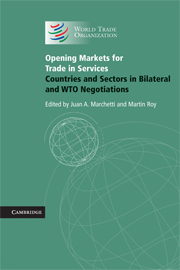Book contents
- Frontmatter
- Contents
- List of figures
- List of tables
- List of boxes
- List of contributors
- Foreword
- Acknowledgments
- Disclaimer
- Summary and overview
- PART I From Policy to Negotiations
- PART II Multilateral and Bilateral Negotiations on Services: Overall Perspectives
- PART III Challenges, Issues and Opportunities in Services Sectors
- PART IV Country Experiences with Services Trade
- 14 GATS plus or minus? Services commitments in comparative contexts for Colombia and Uruguay
- 15 Opening services markets at the regional level under the CAFTA-DR: the cases of Costa Rica and the Dominican Republic
- 16 Why isn't South Africa more proactive in international services negotiations?
- 17 Services liberalization in PTAs and the WTO: the experiences of India and Singapore
- 18 The domestic dynamics of preferential services liberalization: the experience of Australia and Thailand
- 19 The Chilean experience in services negotiations
- Appendix: A reader's guide to basic GATS concepts and negotiations
- Index
- References
16 - Why isn't South Africa more proactive in international services negotiations?
Published online by Cambridge University Press: 05 December 2011
- Frontmatter
- Contents
- List of figures
- List of tables
- List of boxes
- List of contributors
- Foreword
- Acknowledgments
- Disclaimer
- Summary and overview
- PART I From Policy to Negotiations
- PART II Multilateral and Bilateral Negotiations on Services: Overall Perspectives
- PART III Challenges, Issues and Opportunities in Services Sectors
- PART IV Country Experiences with Services Trade
- 14 GATS plus or minus? Services commitments in comparative contexts for Colombia and Uruguay
- 15 Opening services markets at the regional level under the CAFTA-DR: the cases of Costa Rica and the Dominican Republic
- 16 Why isn't South Africa more proactive in international services negotiations?
- 17 Services liberalization in PTAs and the WTO: the experiences of India and Singapore
- 18 The domestic dynamics of preferential services liberalization: the experience of Australia and Thailand
- 19 The Chilean experience in services negotiations
- Appendix: A reader's guide to basic GATS concepts and negotiations
- Index
- References
Summary
Services are increasingly central to economic activity across the developing world, and South Africa is no exception. By African standards, the South African economy is quite diversified and has a robust services sector that in some areas exports competitively, to developing countries and to developed markets. One would therefore expect to find the South African government assertively advancing these export interests through international trade negotiations, while selectively liberalizing access to its domestic services markets in order to ensure their long-term competitiveness and to promote economywide benefits. While there has been some movement in the latter direction, largely through unilateral reforms, in recent years this has not translated into a proactive services trade negotiating strategy.
This chapter explores the reasons for this anomaly, adopting a political economy approach. We argue that the government's negotiating logic in multilateral negotiations is dually informed by the notions of developing country solidarity and the need for developed countries to make the most substantive concessions in order both to fix perceived imbalances in the system and because developing countries need more policy space. This logic inhibits the elaboration of offensive positions in the Doha Round of WTO negotiations with respect to other developing countries, particularly in Africa. It does not explain, however, why South Africa has not overtly developed offensive positions vis-à-vis developed countries, which are the major markets for South Africa's services exports.
- Type
- Chapter
- Information
- Opening Markets for Trade in ServicesCountries and Sectors in Bilateral and WTO Negotiations, pp. 573 - 599Publisher: Cambridge University PressPrint publication year: 2009



